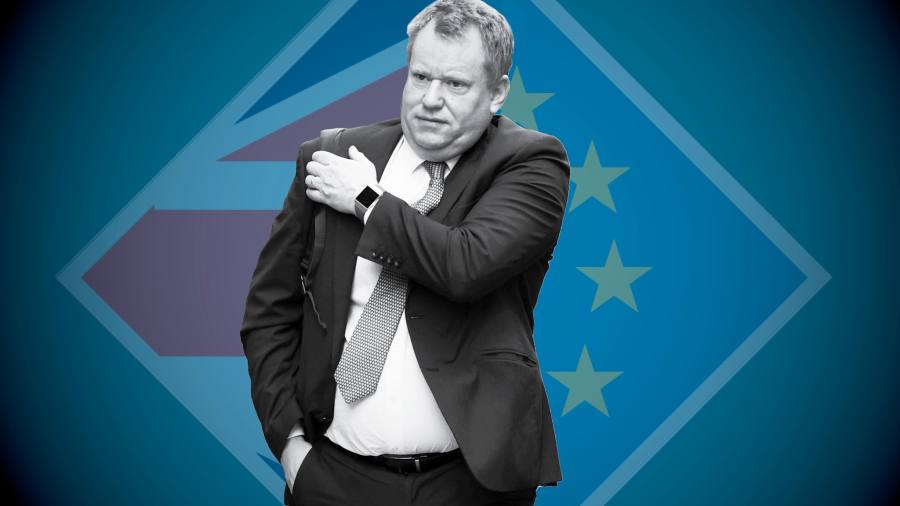[ad_1]
Business groups and UK exporters have called on Lord David Frost to step back from his abrasive approach to dealing with Brussels and seek to build a mutually beneficial trading relationship with the EU.
Frost’s promotion to Boris Johnson’s cabinet as minister for EU relations has coincided with a fresh deterioration in relations between London and Brussels, particularly over the handling of Northern Ireland.
Trade groups, whose members have already suffered millions of pounds of losses as a result of new red tape after Brexit, warned that if both sides did not seek to build consensus then lasting damage would be inflicted on the UK economy.Â
James Withers, chief executive of industry group Scotland Food and Drink, which represents exporters like Scottish salmon farmers who lost £11m in the first two months of trading with the EU this year, said “the ball had been dropped diplomatically†by both sides.
“If the first few weeks of any relationship set the tone, there is a lot of worry about. It feels like we are already at a major crossroads. We face a relationship choice, either collaboration or disintegration. We need the diplomatic temperature to be dialled down,†he said.
Frost’s tough-talking approach to dealing with Brussels — visible in the conducting of last year’s trade negotiations — was on display again last week when the UK announced that it would unilaterally extend grace periods for implementing new arrangements for trade between Great Britain and Northern Ireland.
The UK government move, which government insiders said was the unavoidable consequence of the EU failing to act to reduce the impact of the UK’s Brexit divorce treaty on Northern Ireland’s fragile politics, drew the threat of imminent legal action from the European Commission.
Under the terms of the Northern Ireland protocol — part of the 2019 treaty which secured Britain’s formal exit from the EU — the region, while remaining part of the UK, must follow EU customs rules for goods. To avoid a land border on the island of Ireland, this required the creation of a trade frontier in the Irish Sea to ensure that all goods flowing from Great Britain into Northern Ireland comply with the bloc’s rules.
Having irritated the EU with his move on Northern Ireland, Frost then followed up with an article in the Sunday Telegraph, reported under a front-page headline urging the EU to “Stop Sulkingâ€, in which the former chief Brexit negotiator invited the EU to “shake off any remaining ill will towards us for leaving, and instead build a friendly relationship between sovereign equalsâ€.
One senior Tory said the only reason Johnson put Frost in charge of EU relations, replacing the more emollient Michael Gove, was “because the prime minister wants a row with the EUâ€.
But Frost’s allies say the new minister had not set out to create an “aggressive†atmosphere in his first week and had only been following through on plans for Northern Ireland already drawn up by Gove last month.
They concede that Frost did act without notifying his opposite number in the European Commission, Maros Sefcovic, in advance, but that the step was the “minimum necessary†to avoid disruption in Northern Ireland. “We are not planning anything else like that,†added a senior Tory official.Â
But Brussels has reacted defensively to what it sees as a hectoring British tone. One senior EU diplomat said that “trust was low†and the fear in Brussels was that relations could quickly degenerate into a tit-for-tat battle between the UK and EU.Â
“We can’t accept that we are being taken for granted or being taken for idiots,†the diplomat said. “The opportunity here is that we can start a new cycle in our relationship and move on. The risk is we add insult to injury.â€
Sefcovic himself has complained that Frost chose not to use a “hotline†arrangement that the EU commissioner and Gove had put in place to nip problems in the bud.
Frost tells allies that Brussels is far from blameless, arguing that the EU has been “unhelpful†in a number of areas since the post-Brexit trade deal took full effect on January 1, including through its decision — quickly abandoned — to impose border controls on the island of Ireland for vaccines. He also cites the EU’s treatment of live shellfish exports, which are subject to onerous new restrictions.
Whatever the rights and wrongs, the tough-talking on both sides is alarming business.
Shane Brennan, the chief executive of the Cold Chain Federation that represents the perishable products industry, said Frost must work to ensure that trading businesses did not become “pawns†in a bigger political game stoking longstanding animosities with the EU.
“Adopting a ‘madman’ negotiating strategy might be great politics, but it’s terrible for food supply chains. The next few months are make or break for the food industry. A strong recovery from lockdown is vital and supply chain instability would shatter fragile confidence,†he said.Â
The rise in temperature comes as Cabinet ministers deliberate how strictly the UK should enforce new border controls which are scheduled to be imposed on EU food exporters to the UK after April 1.
Some interest groups, such as hauliers and pig farmers, have argued for a strict approach by the UK government in order to level the playing field with EU competitors, while other interests, such as supermarkets, want a lighter touch approach that prioritises the flow of goods into the UK.
However, Richard Burnett, chief executive of the Road Haulage Association, said there was a contradiction in Frost’s hard-nosed rhetorical approach if, as widely expected, the UK decided to soft-pedal the new controls to reduce the risk of interruptions to supply chains.
“It doesn’t make sense Frost taking a verbal hardline with Brussels, and then taking a light-touch approach to enforcing the new UK border — unless you’ve got good and trusting dialogue between the two parties, which clearly we haven’t,†he said.
[ad_2]
Source link





